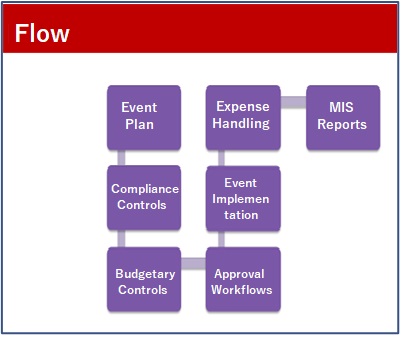
What is Event Management in Pharma?
Pandemic is hopefully behind us. But the way of working that changed during Pandemic is still in vogue. Doctors time was always difficult to get but post Pandemic it has become even more so. Only field visits and different channels of field calls will not suffice. Events give the opportunity to grab the attention of HCP and help get their valuable time.
Analysis of Event data combined with other HCP engagement channels will give a holistic view of the customer experience and enable to drive strategic outcomes for the brand.
A comprehensive Event Management software solution will help Pharma company achieve the necessary Business outcomes.
Different Phases of Event Management are:

-
- Event Planning
- Compliance Controls
- Speaker and Attendee Management
- Contract and Invitations
- Budgetary Controls
- Expense Handling
- Event Implementation
- Attendee Feedback
- Reports
Creating a plan for events in the pharmaceutical industry involves several key steps to ensure a successful and impactful event.
-
- Identify the purpose and objectives: Determine the purpose of the event, whether it’s a Medical conference, Doctor Camp, Sponsorship, RTM or any other type of pharmaceutical event. Define clear objectives and desired outcomes.
- Venue details: Research and choose a suitable event, speakers, venue selection, budgeting, and logistics. Define the Agenda
-
-
- Plan the event: Create a detailed plan for the event, including the agenda, session topics platforms provide tools for creating and managing event schedules, speaker profiles, session descriptions. Budgeting, Expense, approval matrix and Actual Event capturing.
Approval Matrix will ensure the planning and Actuals are within the budget.
-
- Manage participant communications: Send event updates, confirmations, and reminders to registered participants. Automate communication workflows to streamline the process and ensure timely and relevant information reaches attendees.
-
- Coordinate logistics: Work on managing logistical aspects, such as venue selection, catering, audiovisual equipment and accommodation arrangements. Keep track of all necessary information within the software, including contracts, vendor details, and budget allocation.
-
- Track attendance and engagement: Track attendance and participant engagement. This can include features like barcode scanning, badge printing, and session check-ins, digital signature. Analyze the data collected to assess attendee satisfaction and overall event success.
-
- Collect feedback and evaluate: Take survey or feedback to gather post-event feedback from attendees, speakers, and sponsors. Evaluate the event’s success based on attendee feedback, engagement metrics, and achievement of objectives. Use this information to improve future events,
-
- Analyze data and generate reports: Generate comprehensive reports on attendance, engagement, marketing ROI, and other key metrics. Dashboards will generate different analysis on Plan vs Actual, HCP engagements, Budget utilization etc. These reports can help you measure the success of the event and inform decision-making for future events.
Benefits of Event Management Tools are as follows:
-
- Streamlined Event Management: Event software offers comprehensive features for planning, organizing, and managing pharmaceutical events, such as conferences, symposiums, Doctor Camp, RTM and medical education programs. It centralizes event-related tasks, allowing efficient coordination and collaboration among teams, leading to streamlined event management.
-
- Improved Attendee Experience: Event software enables enhanced attendee experiences through various features. It allows participants to register online, access event information, and customize their schedules. Additionally, it facilitates personalized communication, real-time updates, and networking opportunities, enhancing attendee satisfaction and engagement.
-
- Enhanced Efficiency and Productivity: Automating event processes with software saves time and effort. Tasks like registration, payment processing, badge generation, and attendee tracking can be automated, reducing manual work and minimizing errors. This boosts overall efficiency and productivity, allowing the company to focus on core event objectives.
-
- Data Management and Insights: Event software provides robust data management capabilities. It collects and stores attendee information, registration details, feedback, and other relevant data. This data can be analyzed to gain valuable insights into attendee preferences, behavior patterns, and event success metrics. Such insights enable companies to refine future events and improve decision-making.
-
- Cost Savings: Adopting event software can lead to cost savings in multiple ways. It eliminates the need for extensive paperwork, manual data entry, and physical infrastructure like registration desks. Additionally, automating processes reduces labor costs and minimizes the risk of errors, resulting in cost efficiency and improved ROI.
-
- Regulatory Compliance: In the pharmaceutical industry, compliance with regulatory requirements is crucial. Event software can help ensure compliance by providing features like secure data storage, privacy controls, consent management, and adherence to data protection regulations. This helps companies meet legal and ethical obligations associated with handling attendee information. Cap on the fee paid to speakers, on the number of times services have been availed of etc. can be implemented.
-
- Budgetary Compliance: There is a marketing budget set for the year for conducting various events. The event is even bifurcated to various regions within the country. By incorporating these into the system, financial discipline is maintained.
-
- Agreement management: Agreements have to be in place in order to avail of services from HCP. Auto generation and digital signature capability ensures the paper work is seamlessly done and is available on time.
-
- Integration and Connectivity: Event software can be integrated with other business systems, such as customer relationship management (CRM), ERP like SAP, marketing automation, or analytics platforms. This enables seamless data flow, synchronized communication, and coordinated marketing efforts. Integration ensures efficient workflows and maximizes the value of event data across the organization.
-
- Real-time Communication and Engagement: Event software offers real-time communication channels, including chat functionalities, Q&A sessions, live polling, and surveys. These features encourage attendee engagement, facilitate interaction between participants and speakers, and promote knowledge sharing and collaboration.
-
- Scalability and Flexibility: Event software can cater to events of varying sizes, from small workshops to large-scale conferences. It allows customization and flexibility to adapt to specific event requirements. As the company grows and hosts more events, the software can scale accordingly, accommodating increased attendee numbers and expanding event portfolios.
![]() Conclusion
Conclusion
Overall, event software empowers pharmaceutical companies to optimize event management processes, enhance attendee experiences, leverage data-driven insights, ensure compliance, and drive cost savings. By leveraging technology, these companies can deliver successful events, strengthen relationships, and achieve their business objectives effectively.
Deepa G Arun
QA, QMS, CSM – Manager
deepa.g@vsmsoftware.com
VSM Software Pvt. Ltd